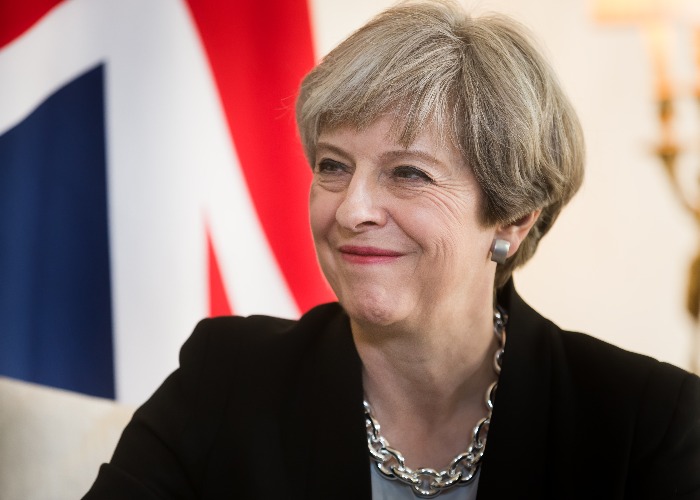UK General Election 2017: what the Conservative manifesto could mean for your money

The Conservative Party has unveiled its 2017 General Election manifesto and there are a few surprising, and controversial, pledges.
The Conservative Party has unveiled its General Election manifesto in Halifax, West Yorkshire, ahead of the UK General Election on 8 June 2017.
As the party is ahead in the polls we’ve taken a look at what a victory would mean for you and your money.
You can read the full manifesto here.
Tax
Theresa May has pledged not to raise VAT, but hasn’t ruled out rises to Income Tax or National Insurance; giving her more room to manoeuvre should she need to raise extra cash.
David Cameron's ‘triple tax lock’, has caused trouble for Chancellor Phillip Hammond, who was forced into a U-turn on his plans to hike National Insurance for the self-employed earlier this year.
To soften the blow May has talked up the Tory party pledge to raise the Personal Tax Allowance to £12,500 and the higher rate threshold to £50,000 by 2020.
Wages
The Conservatives will increase National Living Wage to 60% of median earnings by 2020 and then in line by the rate of median earnings.
It has also pledged to put tighter controls on company pay.
Pensions
The State Pension ‘triple lock’, which ensures pensioner income rises by the higher of inflation, average earnings or 2.5% each year will be replaced with a ‘double lock’ in 2020.
The ‘double lock’ will mean the State Pension will rise by the higher of average earnings or inflation but will no longer be guaranteed to rise by at least 2.5%.
The Conservatives will also get tough on companies that neglect their pension schemes. It will give new powers to the Pensions Regulator to step in and issue fines.
Benefits
The Winter Fuel Allowance, which pays up to £300 to help pensioners with fuel bills – whether they need it or not – will be means tested.
The move will mean better-off pensioners will no longer get the benefit.
Currently the scheme costs £3 billion, but the Institute for Fiscal Studies (IFS) reckons the bill could be halved by moving to a means-tested system.
The money raised from the change is expected to fund health and social care.
All other pensioner benefits, including free bus passes, eye tests, prescriptions and TV licences, won’t be impacted for the duration of this parliament.
Social care
The Conservatives will tackle the rising cost of social care in England with new reforms to means testing.
The threshold for free social care will rise from £23,250 to £100,000.
Currently anyone with assets worth more than £23,250 must pay for the full cost of residential care. Those who don’t get costs covered by their local authority.
Under the Conservative proposals the value of assets would have to be £100,000 before they had to pay, but property would be included in the calculation for people seeking care in their homes.
It's estimated the move would make the Treasury more than £1.3 billion a year, which will go towards funding those that fall under the new £100,000 limit.
To soften the blow the Tories promise no-one will have to sell their home while they or a surviving partner is alive to fund residential or home care.
Instead, the money will be recovered later when they die or sell their home with £100,000 ring-fenced to be passed on to loved ones.
For more on the costs take a look at our guide: How to pay for the cost of care.
Household bills
The Conservatives have pledged to introduce smart meters to every households by 2020 and to introduce an energy tariff cap to protect those that stick with the worst deals from ‘abusive price increases’.
The manifesto stated: 'Energy suppliers have long operated a two-tier market, where those constantly checking for the best deal can do well but others are punished for inactivity with higher prices. Those hit worst are households with lower incomes, people with lower qualifications, people who rent their home and the elderly. A Conservative government will act in their interests.'
The ‘safeguard tariff cap’ will offer price protection to households that tend not to switch.
It’s reported that the policy could save about £100 a year for 17 million families, however, critics think the plan could push up prices for savvy households that do switch deals. Take a look at: Opinion: May’s energy price cap will hit savvy switchers.
Schools
The Conservatives will scrap universal free school lunches for infants and replace them with free school breakfasts for all primary children.
Children from low-income families will continue be able to get free school lunches throughout primary and secondary school.
It’s thought the move would save £650 million a year, which would go towards boosting school funding by £4 billion over the next parliament.
The Conservatives will also scrap the ban on new grammar schools.
Businesses
The Tories will conduct a full review of business rates.
It will also stick to its plan to lower Corporation Tax to 17% by 2020.
Deficit
The Conservatives have pledged to clear the deficit and balance the budget by 2025, three years later than the revised target set by former Chancellor George Osborne.
Slash your energy bills: compare deals today
Read these next:
Opinion: the NHS must pay for gluten-free food
Opinion: it makes financial sense to have another EU referendum
Comments
Be the first to comment
Do you want to comment on this article? You need to be signed in for this feature